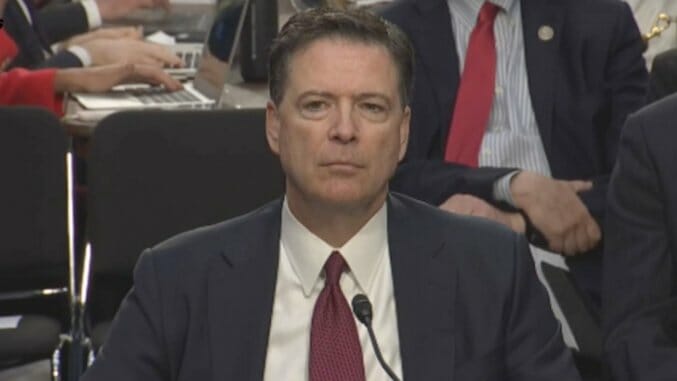Watch Sen. Jim Risch (R-ID) Play a Ridiculous Game of Semantics with James Comey in an Attempt to Save Trump

On Feb. 14, then FBI director James Comey went to the oval office for a counterterrorism briefing with Donald Trump and several others. Following the briefing, Trump ordered everyone to leave the room so he could speak with Comey alone. Here is Comey’s account of the conversation that came next (after Jared Kushner and Jeff Sessions tried to linger, incidentally), from his written testimony prepared for today’s Senate hearing:
When the door by the grandfather clock closed, and we were alone, the President began by saying, “I want to talk about Mike Flynn.” Flynn had resigned the previous day. The President began by saying Flynn hadn’t done anything wrong in speaking with the Russians, but he had to let him go because he had misled the Vice President. He added that he had other concerns about Flynn, which he did not then specify….
The President then returned to the topic of Mike Flynn, saying, “He is a good guy and has been through a lot.” He repeated that Flynn hadn’t done anything wrong on his calls with the Russians, but had misled the Vice President. He then said, “I hope you can see your way clear to letting this go, to letting Flynn go. He is a good guy. I hope you can let this go.” I replied only that “he is a good guy.” (In fact, I had a positive experience dealing with Mike Flynn when he was a colleague as Director of the Defense Intelligence Agency at the beginning of my term at FBI.) I did not say I would “let this go.”
Any reasonable person reading that exchange understands the implication—Trump was using his powerful position to pressure Comey to let the Flynn investigation go. It’s completely inappropriate, and may rise to the level of obstruction of justice. It’s possible—barely—to argue that Trump was trying to advocate for a friend, and not to protect himself. What it’s not possible to argue is that Trump is innocent because he was merely “hoping” that a certain outcome would play out, with no deeper meaning. To do so would be to display a willful ignorance about why Trump cornered Comey, alone, and what exactly he meant by his language.
But that’s exactly what Sen. Jim Risch (R-ID) attempted at today’s hearing, in an attempt to exonerate Trump. In the video below, the good stuff starts at 3:30, after Risch spent the first three minutes Comey’s complimenting record-keeping:
Here’s the text, via Buzzfeed:
Risch and Comey went back and forth about the actual words Trump used during his meeting with Comey, in which Trump allegedly said “I hope you can see your way clear to letting this go,” in reference to the Flynn investigation.
“He did not direct you to let it go,” Risch said
“Not in his words, no,” Comey responded.
“He did not order you to let it go?” Risch continued.